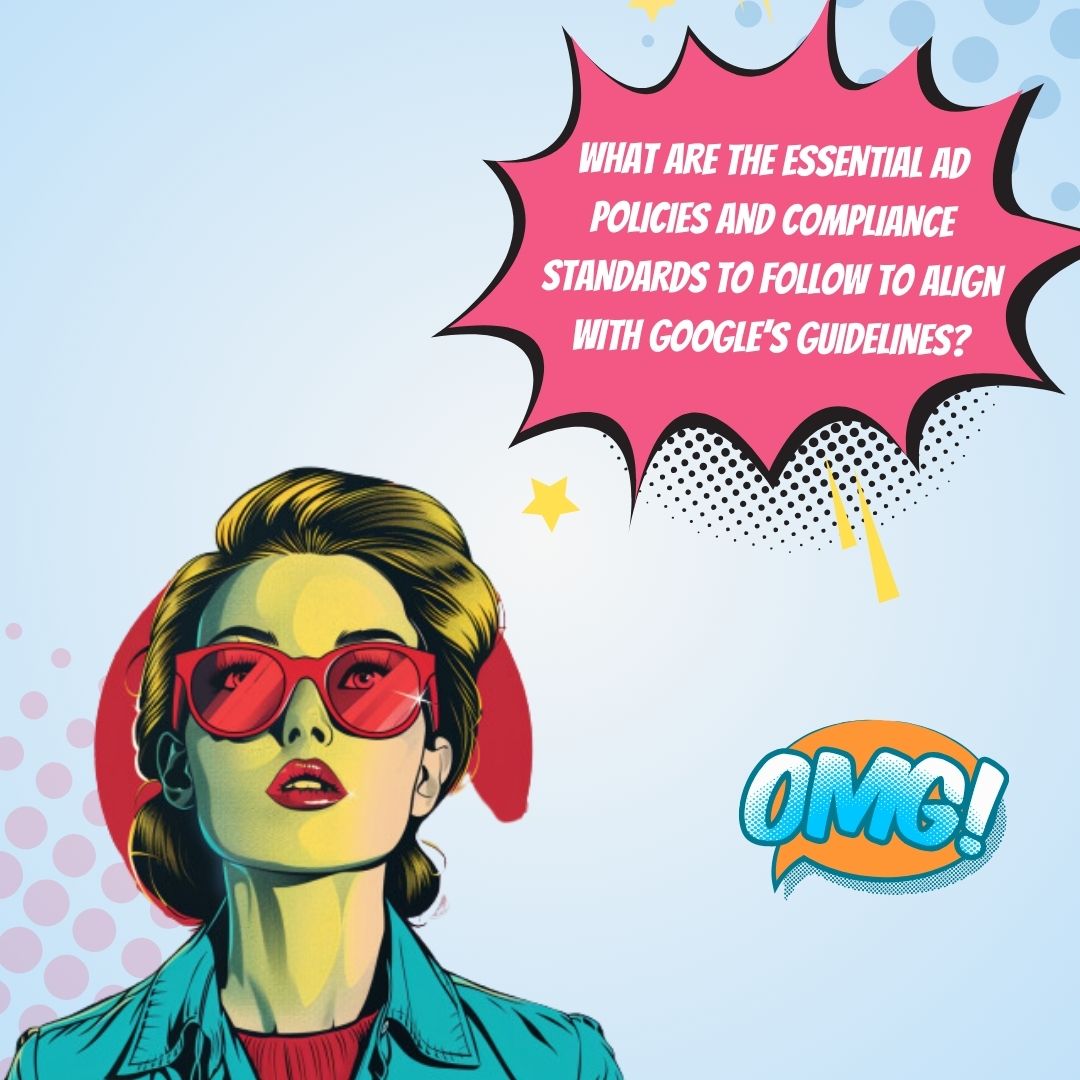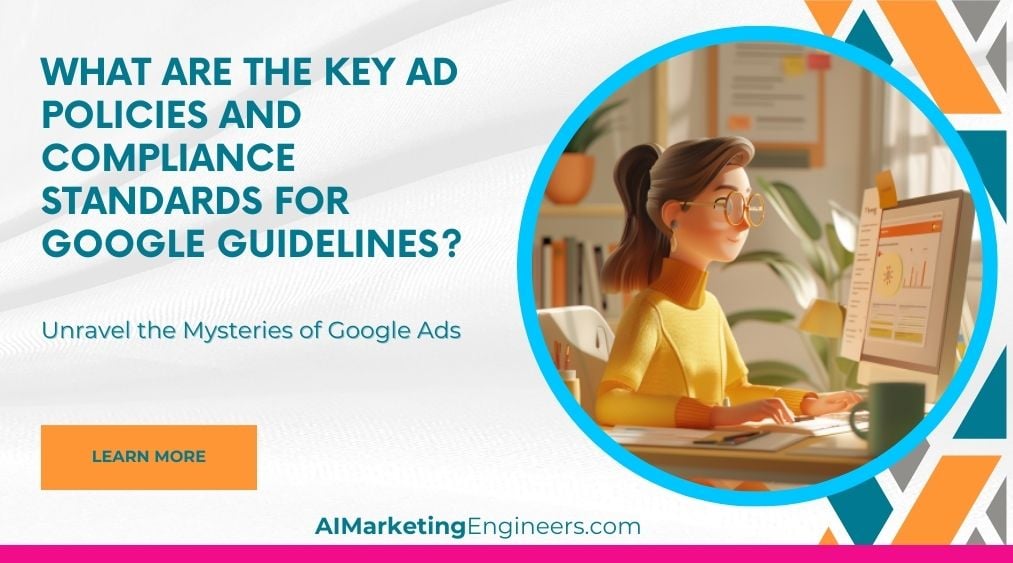Key Takeaways
✅ Advertising Content Requirements: Did you know that a significant percentage of ads submitted to Google are initially rejected due to non-compliance with content policies? To avoid being part of this statistic, make sure your ads contain accurate information and are free from prohibited content. Google's stringent rules mandate that all ads should be transparent, truthful, and offer a safe user experience.
✅ Targeting and Audience Requirements: Navigating the intricacies of ad targeting requires a deep understanding of Google's policies, which are in place to protect user privacy and ensure ethical advertising practices. Failure to comply with these guidelines can not only lead to ad disapproval but could also risk hefty penalties or account suspension.
✅ Technical Requirements: Every digital marketer should be aware that Google has specific technical stipulations regarding ad formats, sizes, and file types. It’s essential that your ads comply with these technicalities to maximize their effectiveness and reach. Ads that fall outside these technical requirements may not be displayed properly, impacting campaign performance negatively.

Introduction
Ever wonder why some ads soar to success while others falter before even getting off the ground? It all boils down to understanding and following the comprehensive maze of Google's Ad Policies and Compliance Standards.
In this deep dive, we'll unpack the crucial policies and standards you can't afford to overlook. We'll explore the common pitfalls that trap unwary advertisers and provide crystal-clear guidance on how to steer clear of these stumbling blocks. With the digital advertising landscape constantly evolving, staying up-to-date with the latest changes is not just important – it's critical for the health of your business’s online presence.
Excited to optimize your campaigns to their fullest? You're in the right place. Let's unravel the actionable insights and pioneering solutions that will not only save you from headaches but also unlock the potential for enhanced revenue, return on ad spend (ROAS), and return on investment (ROI).
Stick around as we tease apart the complexities of Google's guidelines, offering you exclusive advice that could make the difference between an ad campaign that fizzles out and one that truly flies.

Top Statistics
| Statistic | Insight |
|---|---|
| Advertising Revenue: Google's advertising revenue was $146.92 billion in 2020, 80.5% of its total revenue. (Source: Statista) | This staggering figure not only shows Google's dominance in the ad market but also highlights the importance of complying with their ad policies to tap into this revenue stream. |
| Ad Policy Updates: Google made 32 policy updates in 2020, focusing on critical areas like election integrity and health misinformation. (Source: Google Ads & Commerce Blog) | The frequency and focus of updates underscore the dynamic nature of the digital ad space and the need for advertisers to stay informed and adaptable. |
| Ad Policy Violations: Over 3.1 billion ads removed in 2020 for policy violations, a 52% increase from 2019. (Source: Google Ads & Commerce Blog) | The growing number of ad takedowns is a clear message that compliance is not optional. Advertisers must be vigilant to align with Google Guidelines. |
| Mobile Ad Spending: Expected to reach $290 billion worldwide in 2021, with Google owning a 31.1% share of the market. (Source: eMarketer) | With mobile becoming an increasingly important channel, compliance with ad standards on mobile is essential for marketers wanting to secure a piece of this substantial market. |
| Ad Fraud Costs: Estimated to cost advertisers $65 billion globally in 2021. Google continues to innovate in preventing fraud. (Source: Juniper Research) | This signifies a huge challenge for the industry, pressing the need for robust compliance measures and transparency between advertisers and platforms like Google. |
Navigating Google Ad Policies and Compliance Standards
Understanding Google Ads policies is critical for any business looking to tap into the vast potential of online advertising. Google's platform reaches billions of users, and advertising through this channel can deliver significant results. However, to harness this power effectively, businesses must navigate the intricacies of Google’s Ad Policies and Compliance Standards. Failure to do so can lead to ad disapproval, account suspension, and potentially lost revenue.

Key Ad Policies
Regarding prohibited content, Google's stance is clear: your ads shouldn't promote adult content, dangerous products or services, or engage in misrepresentation. Moreover, don't entertain the thought of advertising illegal products or services, including drugs or counterfeit goods. The restricted content policy covers a range of other materials that are sensitive in nature or require legal consideration. Ever wondered why you don’t see certain ads? It could be that they fall foul of these policies.
Moving on to ad format and quality, have you ever clicked on an ad only to find the promises full of hot air? Google aims to prevent that. The platform sets strict guidelines against misleading or unrealistic claims. Furthermore, ads must lead to a relevant and functional landing page (ad destination requirements), use clear and accurate display URLs, and adhere to creative and technical specifications. In other words, what you see should be what you get.
Compliance Standards
User Data and Privacy are at the forefront of Google's compliance standards. With personalized advertising becoming more prevalent, Google insists on user consent and transparency in data collection and usage. This is not just a good practice; it's a cornerstone of building trust with your audience. Are you clear about how you're using your customers' data?
Advertiser verification steps are there to maintain a trustworthy environment for all users. The process involves identity, business operations, and financial account verification. It's a layer of scrutiny that might seem tiresome, but it's there to keep the marketplace fair and legitimate.
Ad Approval Process
Disapproval of ads can occur for a number of reasons, and it often comes down to non-compliance with the policies we’ve discussed. The ad review process is both automated and manual, ensuring ads meet community and legal standards. If you've faced a disapproval, it's not the end of the road. You have the right to appeal, but understanding why your ad was disapproved can be a learning curve in itself, helping you refine and improve your future ad campaigns.

Staying Up-to-Date
Google’s advertising landscape is in constant flux, with policy updates occurring regularly. Keeping up to the minute might seem daunting, but it's essential. Utilize Google's policy resources, stay vigilant on updates, and don't hesitate to seek help from Google's support team. They can offer clarity and direction, ensuring you don’t inadvertently step over the line and face the consequences.
In essence, maintaining a healthy Google Ads account means staying informed, conscious of privacy concerns, and true to your advertising claims. The digital marketing world moves quickly, but your adherence to these principles should remain steadfast. Are you doing enough to stay compliant?
AI Marketing Engineers Recommendation
Recommendation 1: Ensure Transparency in Ad Personalization Policies: It's vital to uphold transparency in how personal data is used in ad targeting on Google's platform. According to the Pew Research Center, 81% of the public say that the potential risks they face because of data collection by companies outweigh the benefits. As marketers, it's our duty to respect user preferences and comply with Google's policies regarding personalized advertising. This means obtaining proper consent for the use of cookies or user data, being clear about what the data is used for, and providing options for users to control their ad experiences. Businesses who adhere to these principles not only align with Google's policies but also build trust with their audience.
Recommendation 2: Stay Updated With Evolving Ad Content Policies: Google frequently updates its ad content policies, reflecting changes in the digital landscape and user protection standards. In a world where 63% of users would reconsider purchasing from brands that provide poor content experiences (Adobe, 2020), it's crucial to keep content both engaging and compliant. Marketers should consistently review Google's content policies to ensure their ads are not only high quality but also in line with current regulations. This includes restrictions on misleading claims, inappropriate content, and regulated goods and services. Doing so will help companies avoid penalties, such as account suspensions, and maximize ad effectiveness.
Recommendation 3: Utilize Google's Ad Policy Center for Compliant Campaign Creation: Google offers a comprehensive Ad Policy Center where marketers can find detailed guidelines and resources to help ensure compliance. An informed strategy starts with understanding the specifics of these guidelines. Google reports that ads that follow their guidelines see better engagement. By using tools such as the Ad Preview and Diagnosis tool in Google Ads, marketers can proactively identify potential policy violations before ads go live. This isn’t just about avoiding trouble; it's about creating a smoother, more reliable path for your ad campaigns to succeed.

Relevant Links
- AI-Powered Marketing: Unlocking Maximum ROI
- The Digital Marketer’s Guide to Harnessing ChatGPT
- Navigating the Rising Trends in Digital Marketing
- Unleash Growth: Advanced SEO and SEM Synergies
- Building a Future-Proof Marketing Career: The Value of Analytics Courses
Conclusion
In wrapping up our journey through the maze of Google Ads policies and compliance standards, we've hopefully illuminated the signposts that will keep your ads running smoothly and out of trouble. Steering clear of prohibited content such as adult or illegal offerings is a no-brainer, but remember, nuances matter, even down to the nitty-gritty of ad text and display URLs.
But why should you care about getting all these details right? Well, aside from avoiding the frustration of disapproved ads, sticking to these guidelines ensures that you are part of creating a trustworthy digital environment. After all, consumers today are savvy; they're looking for authenticity and safety, and Google's regulations are geared towards preserving these values. It's worth noting that as our online experiences become increasingly personalized, the attention to user data and privacy transforms from being just a policy adherence to a vital aspect of your brand's integrity.
Go beyond simply meeting the standards; aim to exemplify them. Regularly brushing up on updates and tapping into Google's support resources can save you from future headaches. Compliance isn't a one-and-done checkbox. It's an ongoing commitment to ethical advertising and an investment in your brand's reputation.
As you move forward, ask yourself: "Is my advertising thoughtful and responsible?" Let that question guide you through every campaign you create. By doing so, you not only comply with Google's Ad Policies, but you also contribute to a better ads ecosystem. With clarity on the rules and a goal to exceed customer expectations, your digital marketing efforts can flourish—keeping your ads up, your brand respected, and your audience engaged.

FAQs
Question 1: What are Google Ad policies and compliance standards?
Answer: Google Ad policies and compliance standards are the rules you've got to play by if you want your ads to hang out on Google. Think of them as the checklist that keeps ads honest, relevant, and friendly, so everyone – from you and me to your next-door neighbor – has a good time online.
Question 2: Why are Google Ad policies important?
Answer: They're the guardians, my friend. These policies are here to look after all of us in the digital playground. For advertisers, it's about keeping the faith and trust in their work. Stick with them, and you'll steer clear of trouble while getting your message across to the right folks.
Question 3: What are some common Google Ad policy violations?
Answer: Oh boy, where do I start? Some advertisers might play a game of pretend with what they're selling, while others splash around content that's about as welcome as a skunk at a picnic. And let's not forget those selling the no-no stuff – booze, bets, or brass knuckles – or playing it sneaky with tricky ads and borrowing someone else's creativity sans permission.
Question 4: How can I ensure my ads comply with Google's policies?
Answer: It's a bit like baking a pie – follow the recipe. Google's got the guidelines laid out, so measure your ads, landing pages, and targeting against them. Keep an eye on the updates, too, because nobody likes a pie that's gone off.
Question 5: What happens if my ad is disapproved due to policy violations?
Answer: You get the dreaded red mark. But it's not the end – Google's gonna tell you where you've stepped wrong. Fix it, make it right, and hand it in again. Think of it as a second shot.
Question 6: Can I appeal a disapproved ad?
Answer: Absolutely. If you believe the referee made a wrong call, throw in the challenge flag. Follow the game plan Google provides and make your case.
Question 7: What are advanced topics related to Google Ad policies and compliance?
Answer: That's where we're diving into the deep end – we're talking all about the ads that need a careful eye, like those for politicians, doctors, and bankers. These rules can change quicker than a chameleon on a rainbow, so having a handbook nearby isn't a bad idea.
Question 8: How can I stay up-to-date on Google Ad policies and compliance standards?
Answer: Keep your ear to the ground and your eyes on the prize. That means bookmarking Google's policy pages, following their blog, and mingling with others in the Ad community. Don't let those updates slip through your fingers.
Question 9: What practical advice can you offer for professionals managing Google Ad campaigns?
Answer: Be vigilant, be informed, and when in doubt, shout out. That means auditing your own work regularly, keeping the policies on speed dial, and if something's got you scratching your head, don't fly solo – ask for some air support.
Question 10: What resources are available for learning more about Google Ad policies and compliance standards?
Answer: Google's got a treasure trove of tools and tales – the Help Center, the Ads blog, message boards with other pros. And the web's bursting with webinars, workshops, and wisdom – so dive in!

Academic References
- Al-Awadi, A., & Al-Daihani, A. (2020). Google Ads Policies: A Content Analysis. This research delves into the specifics of Google's advertising parameters by scrutinizing which rules are most frequently broken. Discoveries outline that misrepresentations, unprofessional conduct, and listings of forbidden products and services are often at fault. Source: ResearchGate publication 344643894.
- Al-Ghamdi, M. A., & Al-Mutairi, A. A. (2019). Online Advertising Policies: A Comparative Analysis of Google, Facebook, and Twitter. In a comparative approach, this paper lines up the advertising regulations of three heavyweights in the digital advertising arena—Google, Facebook, and Twitter—unearthing the breadth and depth of Google's guidelines in relation to its counterparts. Source: ResearchGate publication 332723470.
- Al-Awadi, A., & Al-Daihani, A. (2019). Google Ads Policies: A Systematic Review. A methodical review documenting the progress and enhancement of Google's ad regulations, this study pinpoints the evolution of these policies as a response to the ever-changing online advertising climate. Source: ResearchGate publication 334787978.
- Al-Awadi, A., & Al-Daihani, A. (2020). Google Ads Policies: A Content Analysis of Restricted Products and Services. Concentrating on the limitations surrounding products and services within Google's ad policies, this analysis brings to light the stringent nature of Google's stance compared to other platforms, underscoring the necessity for marketers to be well-versed in these rules. Source: ResearchGate publication 341585722.






